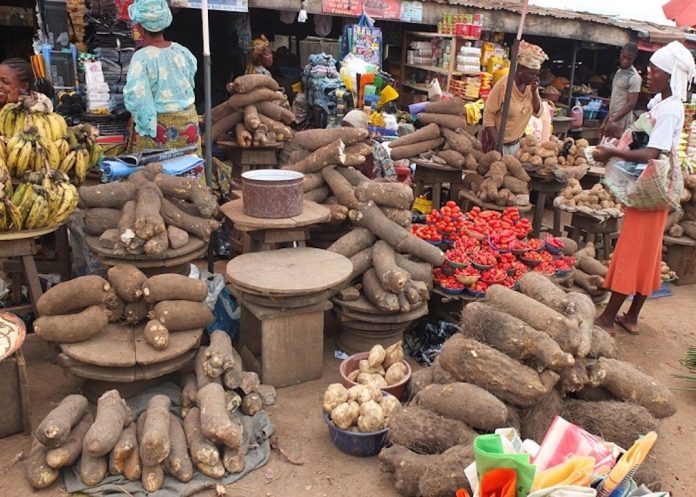Nigerians lament rising cost of living and staple food prices as the country’s inflation jumped to 24.08 per cent in July 2023.
The current inflation rate is the highest recorded leap in 2023 and the highest since September 2005. In June, inflation was recorded at 22.79 per cent, but has now jumped by 1.29 percentage points.
The inflation was caused by increases in prices of basic food items, including oil and fat, bread and cereals, fish, potatoes, yam and other tubers, fruits, meat, vegetables, milk, cheese, and eggs.
As a result, food inflation rose to 26.98 per cent on a year-on-year basis, which was 4.97 per cent points higher, compared to the rate recorded in July 2022 (22.02 per cent).
The Financial Derivatives Company in its recent Economic Bulletin had projected that the country’s inflation would go as high as 23.35 per cent.
The report said, “We are projecting a further increase in headline inflation to 23.35 per cent from 22.79 per cent in June. This would mark the seventh consecutive monthly increase and the highest inflation rate in 18 years. Apart from the sustained uptick in the general price level, the slope of the inflation curve is becoming steeper (i.e. the rate of change in inflation is increasing). This is an indication that the impact of recent policy changes is becoming more evident.
“In a period of one month, the price of PMS has increased twice, first to N488/ltr and then to N617/ltr. Diesel price is also up 5.88 per cent to N720/ltr from N680/ltr, pushing up transport and logistics costs.”
According to the World Bank, Nigeria has one of the highest inflation rates globally and an estimated four million people fell into poverty between January and May 2023.
A market check shows that the prices of food items have been on a steady rise since the beginning of the year as the continuous rise in the inflation rate worsens the situation.
Findings show that a medium-sized loaf of bread, which sold for N600 in June is now sold for N1,000 and 1,200 respectively.
The price of a 100kg bag of rice rose from about N55,000 – N57,000 to N70,000 -75,000. The price of spaghetti also increased from N500 to N600-N700.
The price of a crate of eggs rose from N1,200 to N2,500 for the big size; and the small size, N2, 200.
According to the Director of the Centre for the Promotion of Private Enterprise, Dr Muda Yusuf in a statement on Tuesday said, the surging inflation has had a devastating effect on citizens’ welfare and the health of small businesses.
He noted that spikes in energy prices, rising transportation costs, logistics challenges, forex market illiquidity, hike in diesel cost, insecurity in many farming communities, and structural bottlenecks impeding productivity are responsible for the persistent rise in inflation.
“The surging inflation has had a devastating effect on citizens’ welfare and the health of small businesses.
“It is imperative to urgently fix production and productivity constraints, stabilise the exchange rate by ensuring liquidity in the forex market, tackle insecurity, accelerate efforts to ensure domestic refining of petroleum products and fast-tracking tax and fiscal reforms to curb escalating deficit spending,” he stated.
A Lagos-based mother of three, Mrs Bose Iyanda said, “I have only N200 on me, even my husband had to borrow to pay his staff last month. It seems we are working yet no profit, it has been tough.
“Food items keep increasing every week, yet there is no money, and there is nobody to even lend anyone money anymore.”
A trader in Abuja, Aneef Isah said, “When I buy things now, I have to earnestly pray that God should bring customers because people hardly buy things the way they used to buy, and you cannot blame them. The country is hard, and people are just managing.
“As a trader, I am not intentionally increasing the prices, it is how we buy things that will determine how we will sell them.”


